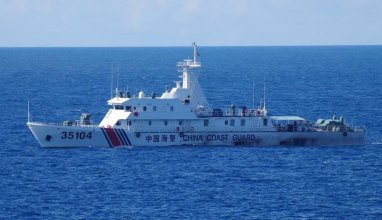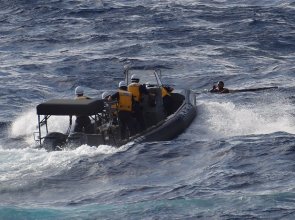Chinese Senkaku swarm tactic spells trouble for Japan
China’s use of an armada of fishing boats — part of its so-called maritime militia — near the disputed Senkaku Islands could spell trouble for Tokyo as Beijing ramps up its assertiveness in the East China Sea, experts say.
On Sunday morning, Tokyo lodged a protest with the Chinese Embassy after two China Coast Guard ships entered what Japan calls its territorial waters around the uninhabited islands that it administers. Seven other Chinese ships were meanwhile spotted in the so-called contiguous zone just outside, the Japan Coast Guard said.
A day earlier, Tokyo protested to Beijing after seven Chinese Coast Guard ships and about 230 fishing vessels, an unusually high number, sailed close to the territorial waters around the islets, which are also claimed by China and Taiwan.
Three of the coast guard ships were apparently armed, the Japanese Foreign Ministry said. Chinese coast guard vessels routinely sail near the islands, and some armed ships were recently spotted in the area.
China usually brushes off Japan’s complaints, saying the Japanese-controlled islands are an “inherent part” of Chinese territory.
Saturday’s actions, however, have likely stoked long-held concerns in Tokyo of a swarm of fishing boats descending on the area around the Senkakus, effectively overwhelming Japanese patrols.
“The latest developments … do seem to be a potentially significant escalation as we have not seen this type of Chinese action before of that scale,” said Christopher Hughes, a professor of international politics and Japanese studies at the University of Warwick in England. “Japanese policymakers have long worried that China might try to impose control on the Senkakus through using some type of large-scale civilian/paramilitary presence that it would be hard to counter with Japan Coast Guard resources or justify the use of force for.”
‘Flooding the zone’
While similar tactics by China have been noted before in Japanese waters, including near the Senkakus, Saturday’s mass of vessels was one of the first in many years.
In April 1978, just months before Tokyo and Beijing inked a peace and friendship treaty in October that year, hundreds of fishing vessels entered Japanese territorial waters near the Senkakus, stoking concern in Tokyo. Though China’s then-vice premier, Deng Xiaoping, said the incursions had been “incidental,” and that China “would never engage in such incidents,” Japanese officials feared such actions would return in the future.
More recently, between April and November 2014, hundreds of Chinese fishing boats believed to be coral poachers were spotted in the Pacific Ocean around the Ogasawara Islands about 1,000 km south of Tokyo, and another 100 or so were seen near the Izu Islands, closer to the mainland.
These boats, which openly flew the Chinese flag, were likely dispatched with Beijing’s tacit approval to gauge the Japan Coast Guard’s response, observers have said.
“In that case, Japan detained a few boats and fined the skippers,” said retired U.S. Marine Col. Grant Newsham, a senior research fellow at the Japan Forum for Strategic Studies in Tokyo. “However, the Japanese were basically helpless when faced with the fishing armada.”
Newsham said this served two purposes: to gauge the Japanese response and to inflict psychological damage.
“The Chinese demonstrate that anytime they want, they can ‘flood the zone’ and establish dominance — while daring the Japanese to do something,” he said.
This dominance is largely due to the overwhelming number of boats the Chinese side possesses.
While the Japan Coast Guard had 128 patrol vessels as of April 2015, it is estimated that its Chinese counterpart has more than 200 maritime enforcement vessels, including a pair of recently built 10,000-ton “monster” ships, the biggest coast guard vessels in the world.
Beijing can also count on its maritime militia, which consists ostensibly of potentially hundreds of thousands civilian craft and personnel, to harass rivals and safeguard its maritime interests.
Experts say that the use of the maritime militia is a part of China’s long-established “salami-slicing” strategy in both the East and South China seas. This strategy employs the slow accumulation of small actions, none of which is a casus belli, but which add up over time to a major strategic shift.
“The operations near the Senkaku Islands are similar to Chinese maritime militia operations previously conducted near the Philippines, Vietnam, Malaysia, and Indonesia’s Natuna Islands,” said James Kraska, research director at the Stockton Center for the Study of International Law at the U.S. Naval War College. “In each case a large number of Chinese fishing vessels from China’s maritime militia operate in concert with a handful of Chinese Coast Guard command and control ships.
“The maritime militia is an effective tool because it shifts the onus onto Japan to respond to low-level coercion,” Kraska added.
South China Sea link
The moves also come as Beijing seeks to temper its response to a decision last month by an international arbitration tribunal that effectively rejected its claims to much of the South China Sea. Tokyo has pressed Beijing to abide by the ruling, stoking anger in China, which swiftly accused Japan of meddling in its affairs.
According to Jonathan Miller, an international affairs fellow with the Council on Foreign Relations, China’s behavior near the Senkakus is likely meant to press Tokyo, which has been vocal in its support of the tribunal’s decision, while also actively supporting maritime capacity building among rival claimants in Southeast Asia.
But more importantly, Miller said, the recent actions also target the United States.
“China is looking for leverage points in its complex relationship with the U.S. and feels that pushing back in the East China Sea can also send signals on its resolve in the South China Sea,” said Miller. “It also risks less blowback internationally, now that Chinese activities have been in the spotlight in the South China Sea.”
Tetsuo Kotani, a senior fellow at the Japan Institute of International Affairs in Tokyo, said the timing of the actions also reflects competition in the ruling Communist Party leadership in Beijing.
The administration of Chinese President Xi Jinping, Kotani said, needed to demonstrate that it is “enhancing effective control” of both the East and South China seas ahead of the annual Beidaihe meeting, or “summer summit,” where a faction led by former Presidents Jiang Zemin and Hu Jintao was likely to criticize the arbitration ruling and Japan’s diplomatic moves.
China has urged bilateral talks on the South China Sea issue with the claimants but has also bolstered its military presence in those waters and in the East China Sea.
“This is all part of China’s ongoing, long-term effort to dominate and physically control the South China Sea and East China seas,” said Newsham.
“One shouldn’t look at the Chinese actions in the East China Sea and South China Sea in isolation, but rather consider the entire map and what China intends to do.”
Newsham noted that while China’s claims to the South China Sea get the bulk of attention, a hawkish Chinese general and state media reports quoting Chinese scholars have even asserted that not the only the Senkakus, but also the entire Ryukyu chain — including Okinawa — are historically Chinese territory.
“China is patient and takes a long-term approach,” he said. “Applying pressure when it can and seeing what it gets away with. But it is the continuous pressure and probing that moves the ‘baseline’ farther for China’s advantage.”
Wearing Japan down
According to maritime security experts, China’s strategy appears to be one of attrition to grind down its rivals. In the case of the Senkaku Islands, this is likely to be by establishing a regular, permanent presence and gradually tiring out the Japanese.
“Fishing fleets, which are ultimately an extension of the Chinese government and its coercive power, are a perfect tool — as they give the appearance of being ‘nonmilitary’ and somehow less threatening,” Newsham said, adding that China has already had some success displacing Japanese fishermen there. “That trend will continue,” he said.
With this uptick in activity in the East China Sea, Tokyo may need to take an even more serious look at its defense spending, which topped ¥5 trillion for the first time in fiscal 2016.
“There may be some good intentions on the Japanese side, but if you won’t spend the money, you’re not serious,” said Newsham. “What we’re seeing in the East China Sea is ultimately Japan’s failure to spend adequately on defense for decades and to develop an SDF (the Self-Defense Forces) capable of defending Japanese territory — as opposed to preparing a static defense of Hokkaido if the Russians invaded.”
As for any role the United States could play in the dispute, experts say more joint exercises and patrols in the region could play a strong role in deterring China while also bolstering the bilateral military alliance.
“Never forget the political/psychological aspect of U.S.-Japanese forces operating together,” said Newsham. “The Chinese understand this bit perfectly well.”
Other options for making a statement include the U.S. restarting firing exercises at ranges in the Senkakus, which Washington has declined to use since the administration of President Jimmy Carter in the late 1970s.
But in dealing with China’s asymmetrical threat, Japan must tread carefully or risk seeing any minor conflagration turn into a full-fledged conflict.
“Keep in mind that China will claim that anything the Japanese do is an ‘escalation’ and a ‘provocation,’ ” said Newsham. “My sense is that Japan is somewhat hamstrung at the moment.
by Jesse Johnson
Staff Writer




